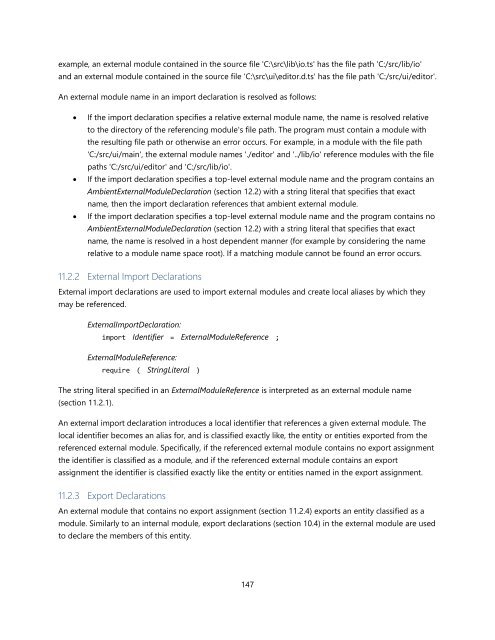TypeScript Language Specification v1.5
TypeScript Language Specification v1.5
TypeScript Language Specification v1.5
You also want an ePaper? Increase the reach of your titles
YUMPU automatically turns print PDFs into web optimized ePapers that Google loves.
example, an external module contained in the source file 'C:\src\lib\io.ts' has the file path 'C:/src/lib/io'<br />
and an external module contained in the source file 'C:\src\ui\editor.d.ts' has the file path 'C:/src/ui/editor'.<br />
An external module name in an import declaration is resolved as follows:<br />
<br />
<br />
<br />
If the import declaration specifies a relative external module name, the name is resolved relative<br />
to the directory of the referencing module's file path. The program must contain a module with<br />
the resulting file path or otherwise an error occurs. For example, in a module with the file path<br />
'C:/src/ui/main', the external module names './editor' and '../lib/io' reference modules with the file<br />
paths 'C:/src/ui/editor' and 'C:/src/lib/io'.<br />
If the import declaration specifies a top-level external module name and the program contains an<br />
AmbientExternalModuleDeclaration (section 12.2) with a string literal that specifies that exact<br />
name, then the import declaration references that ambient external module.<br />
If the import declaration specifies a top-level external module name and the program contains no<br />
AmbientExternalModuleDeclaration (section 12.2) with a string literal that specifies that exact<br />
name, the name is resolved in a host dependent manner (for example by considering the name<br />
relative to a module name space root). If a matching module cannot be found an error occurs.<br />
11.2.2 External Import Declarations<br />
External import declarations are used to import external modules and create local aliases by which they<br />
may be referenced.<br />
ExternalImportDeclaration:<br />
import Identifier = ExternalModuleReference ;<br />
ExternalModuleReference:<br />
require ( StringLiteral )<br />
The string literal specified in an ExternalModuleReference is interpreted as an external module name<br />
(section 11.2.1).<br />
An external import declaration introduces a local identifier that references a given external module. The<br />
local identifier becomes an alias for, and is classified exactly like, the entity or entities exported from the<br />
referenced external module. Specifically, if the referenced external module contains no export assignment<br />
the identifier is classified as a module, and if the referenced external module contains an export<br />
assignment the identifier is classified exactly like the entity or entities named in the export assignment.<br />
11.2.3 Export Declarations<br />
An external module that contains no export assignment (section 11.2.4) exports an entity classified as a<br />
module. Similarly to an internal module, export declarations (section 10.4) in the external module are used<br />
to declare the members of this entity.<br />
147


















